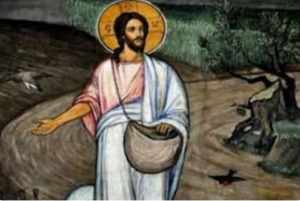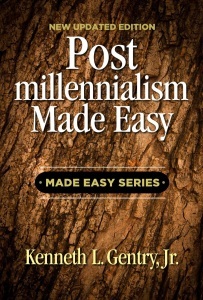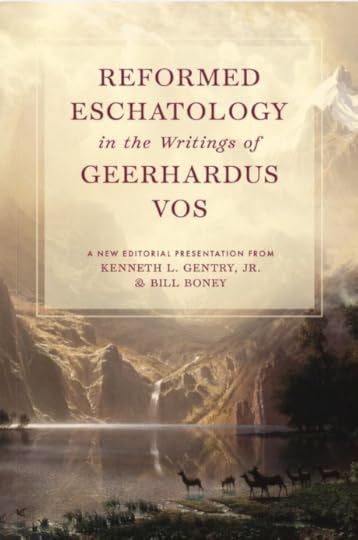POSTMILLENNIAL PARABLE OF THE SOWER
PMW 2025-068 by Kenneth L. Gentry, Jr.
The Apostle Matthew appears, at least in part, to place the Kingdom Parables in the narrative context, according to R. T. France, in order to explain the “problems” surrounding the kingdom. In Matthew 12:28 we read: “if I cast out demons by the Spirit of God, then the kingdom of God has come upon you.” But if the kingdom now exists, why does it not show itself? Remember: the Jews expect a political Messianic kingdom. Why does it appear so small and weak? Why do so many reject it? Indeed, most of Israel is rejecting the king, as we see in Mt 13:57: “And they took offense at Him. But Jesus said to them, ‘A prophet is not without honor except in his home town, and in his own household.’”
The Lord presents this whole set of parables, then, so that his followers might “know the mysteries of the kingdom of heaven” — though to others “it has not been granted” (Mt 13:11), and intentionally so (13:13–16). Consequently, the parables frequently mention the kingdom’s hidden nature, small presence, and wavering condition (Mt 13:9–17, 19–22, 35–28, 31, 33, 44–45). This is not the first century Jewish hope for the Messianic kingdom; nor is it the premillennialist or dispensationalist expectation of an Armageddon-introduced kingdom. Contrary to such thinking, Matthew carefully records our Lord’s explaining the “mystery” of his kingdom, a mystery that confuses even his followers: “we were hoping that it was He who was going to redeem Israel” (Lk 24:21; cp. Mt 13:36). As per the postmillennial system (and much like its sister, amillennialism) the Kingdom Parables sketch the present, spiritual, and developmental nature of the kingdom.
Postmillennialism Made Easy (by Ken Gentry)
Basic introduction to postmillennialism. Presents the essence of the postmillennial argument and answers the leading objections. And all in a succinct, introductory fashion.
See more study materials at: www.KennethGentry.com
The Parable of the Sower (Mt 13:3–23)
The first parable, The Parable of the Sower (Mt 13:3–23), fits well with a postmillennial scheme and differs greatly from premillennial expectations. In fact, we know that in the wider Gospel record Christ rejects all political and revolutionary implications for his kingdom. He simply shows no interest in a political kingship. When he perceives that a crowd was “intending to come and take Him by force, to make Him king” he “withdrew again to the mountain by Himself alone” (Jn 6:15). When the Pharisees press him regarding his kingdom’s coming, he distinguishes it from political kingdoms and from the dramatic Jewish expectations: “The kingdom of God is not coming with signs to be observed; nor will they say, ‘Look, here it is!’ or, ‘There it is!’ For behold, the kingdom of God is in your midst” (Lk 17:20–21). When he stands before the Roman procurator Pilate, who was entrusted with keeping Judea under Roman control, the Lord declares that his kingdom “is not of this world” and therefore his servants will not fight (Jn 18:35). Rather his kingship is “to bear witness to the truth” (Jn 18:37). His response to Pilate is so clear — and so different from the Jewish accusations — that Pilate declares: “I find no guilt in Him” (Jn 18:38). Pilate sees Christ in a far different light than he does the revolutionary Barabbas (Mt 27:16–17).
Predestination Made Easy
(by Ken Gentry)
A thoroughly biblical, extremely practical, and impressively clear presentation of
the doctrine of absolute predestination.
See more study materials at: www.KennethGentry.com
In the Parable of the Sower Jesus notes that the kingdom spreads by means of God’s Word — not by “sword’s loud clashing” (Mt 26:51–52; Lk 17:30–31). And that its message fails to convert some hearers, though not those of good heart (Mt 13:18–23). He even explains that Satan hampers the kingdom’s growth (Mt 13:19). But despite this means of the kingdom’s spreading and its resistance from Satan, the kingdom nevertheless “bears fruit, and brings forth, some a hundredfold, some sixty, and some thirty” in those who convert (Mt 13:23). Furthermore, rather than awaiting the distant future for establishing his kingdom, in the first century Christ sows his kingdom in the world.
Reformed Eschatology in the Writings of Geerhardus Vos
Ed. by Ken Gentry and Bill Boney
This is a collection of several key eschatological studies by the renowned Reformed theologian Geehardus Vos. We have modernized Vos’ grammar and syntax and updated his layout style according to modern publishing conventions (shorter sentences and paragraphs). We did this without changing any of Vos’ arguments.
For more information on this new Vos work or to order it, see:
https://www.kennethgentry.com/reformed-eschatology-in-the-writings-of-geerhardus-vos/
Kenneth L. Gentry Jr.'s Blog
- Kenneth L. Gentry Jr.'s profile
- 85 followers



